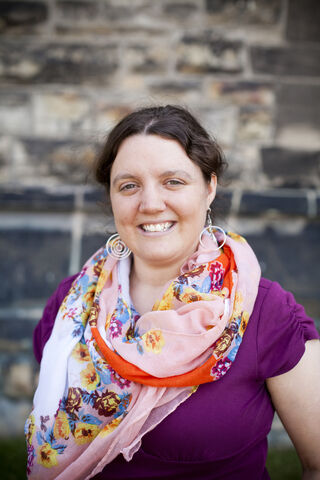Trauma
Mental Health, Trauma, and the Nonprofit Sector
You may want to heal the world, but you can’t pour from an empty cup.
Posted April 12, 2022 Reviewed by Ekua Hagan
Key points
- In helping professions, there can be shame, guilt, and apparent weakness associated with admitting to experiencing compassion fatigue.
- Mental health problems are extremely common: In Canada by age 40, 50% of the population will have or have had a mental illness.
- Civil society organizations that help people should be considered trauma-exposed organizations and provide support for staff.

This is a guest post by Rebekah Sears, Policy Analyst and Government Relations Specialist for Mennonite Central Committee (MCC) Canada’s Peace & Justice Office.
“You can’t pour from an empty cup.”
The words came from a place of kindness and empathy, from someone who knew the feeling. It hit me to my core; because I was empty.
I was at lunch with a mentor, someone who’d been in my line of work for his whole career—international development and peacebuilding.
It was 2015, days after the photo of the Syrian child Alan Kurdi was on the front page of newspapers around the world. This was the moment when the world finally awoke to the realities of the global refugee crisis. Now the images were all over the news. It was relentless; the suffering seemingly endless.
This wasn’t the first time, nor the last time I’ve felt completely exhausted, overwhelmed and burned out by my work.
Within Civil Society Organizations (CSOs) in the nonprofit sector we see images like this and hear the stories that go with them all the time. We often visit or talk with folks living and working in active conflict zones, regions experiencing droughts or famines, or forcefully displaced from their homes.
We try to emphasize the positive and resilient response to systems of injustice and the strength of local partners and communities in which we work—and there is so much resilience and strength. But one can’t totally escape the complex and often incredibly difficult circumstances in which many people live every day.
In addition to programs countering injustice and addressing the root cause of violence, many organizations support local partners in programming such as trauma healing, reconciliation, and positive mental health support. These programs are essential to help build even more resilience and help people cope with seemingly impossible circumstances. These programs, alongside the main projects, respond to the holistic needs of each person.

However, what we don’t often talk about are the impacts, short-term and long term, on those of us watching and walking with others in these kinds of circumstances: those on the ground accompanying communities; those visiting and spending time with project participants; and those at their desks reading the harrowing stories from halfway around the world.
Though not always said out loud, this is often coupled with an attitude of “suck it up” and a kind of messiah complex. After all, those accompanying others are not going through the same things—they cannot be suffering so much. There is a kind of shame, guilt, and apparent weakness sometimes associated with needing to step back and catch one’s breath.
However more and more we are learning that this is not a fair assessment. Where I'm from, Canada, we know from the Canadian Mental Health Association that 1 in 5 Canadians in any given year will experience a mental health problem or illness, and by age 40, 50% of the Canadian population will have or have had a mental illness. The helping and serving sectors are potentially very vulnerable, due to the proximity to trauma.
I speak to this from a very personal perspective coming from a lived experience with a chronic mental illness, which makes me even more susceptible to my circumstances, and vulnerable to secondary trauma and burnout.
This is why I argue that many CSOs should be officially recognized, both internally and externally, as trauma-exposed organizations—that is, the staff are regularly coming in close contact with trauma even if it is not their own, and this brings a risk of mental health issues. Yet the resources for help and support remain limited.
Some of these risks, in addition to regular mental health challenges, include what those in the helping sectors refer to as compassion fatigue or empathetic strain. Dr. Francoise Mathieu, in her book, The Compassion Fatigue Workbook: Creative Tools for Transforming Compassion Fatigue and Vicarious Traumatization [also known as Secondary Traumatic Stress], describes compassion fatigue as “the profound emotional and physical exhaustion that helping professions and caregivers can develop over the course of their careers as helpers… [and is often] described as the ‘cost of caring.’”
Mathieu is the Executive Director of the Tend Academy, an organization and network that seeks to support those in helping and serving sectors to find support, create healthy boundaries, and develop the skills to care for others well, while also caring for themselves. These include healthcare workers, social workers, police officers, teachers, and more.
Earlier in the workbook, she sets the stage for the days we live in and its implications for those who serve, noting, “the reality is that we work amid oceans of pain and there will always be more clients in need than we can possibly help.”
Yet, in my experience, it is still rare for this to be acknowledged or understood or for robust systems of support to be provided within the international development and peace sectors. Change is coming slowly in some areas. An organization in the sector that I’m familiar with, for example, recently carried out trauma resiliency training for all national staff. This was in part due to a trauma audit that was carried out several years ago by a friend, Heather Peters, as part of her graduate studies. In the introduction, Heather called on the organization’s mission statement to serve and reach out to the most vulnerable, a call also to support staff who are struggling. She writes:
“[Our] mission statement emphasizes the value we place on those in vulnerable situations and the intent to demonstrate love and compassion through the work to meet people’s basic needs. In order to live up to this mission, [we] must value the places where people are coming from, the experiences they have had, and how these experiences have shaped lives. Likewise acknowledging that [our] staff, in acting with love and compassion, are also susceptible to experiencing trauma through their work. [Our] mission statement calls for careful reflection on how relationships are honoured with God, nature, and each other by recognizing the experiences that cause brokenness and healing.”
Often these kinds of changes come from within, from individuals like my friend Heather and others. They encourage me to keep raising the issues and bringing small changes until we see the big changes we need; until the sector fully embraces and comes alongside its workers who feel lost and overwhelmed.
Rebekah Sears has worked in the non-profit sector for her entire career thus far on international development, peace, and policy. She currently lives in Ottawa.




